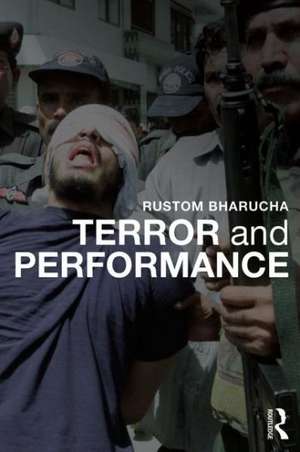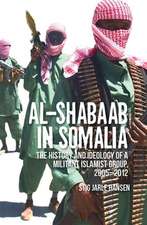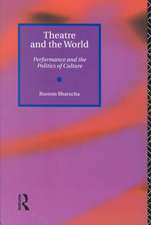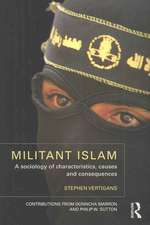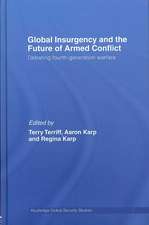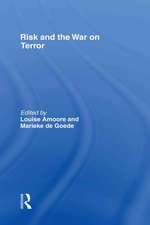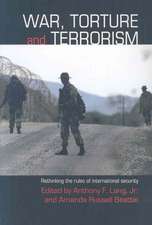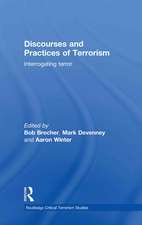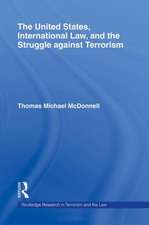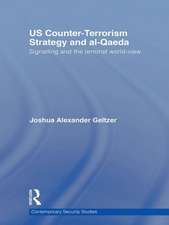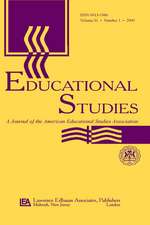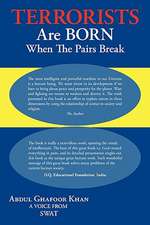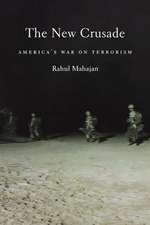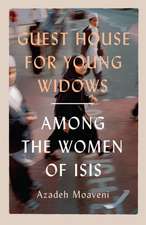Terror and Performance
Autor Rustom Bharuchaen Limba Engleză Paperback – 7 apr 2014
‘This book is not only timely. It is overdue – and it is a masterpiece unrivalled by any book I know of.’ Erika Fischer-Lichte, Freie Universität Berlin
‘The first and only book that focuses on the intersections of performance, terror and terrorism as played out beyond a Euro-American context post-9/11. It is an important work, both substantively and methodologically.’ Jenny Hughes, University of Manchester
‘A profound and tightly bound sequence of reflections … a rigorously provocative book.’ Stephen Barber, Kingston University London
In this exceptional investigation Rustom Bharucha considers the realities of Islamophobia, the legacies of Truth and Reconciliation, the deadly certitudes of State-controlled security systems and the legitimacy of counter-terror terrorism, drawing on a vast spectrum of human cruelties across the global South. The outcome is a brilliantly argued case for seeing terror as a volatile and mutant phenomenon that is deeply lived, experienced, and performed within the cultures of everyday life.
| Toate formatele și edițiile | Preț | Express |
|---|---|---|
| Paperback (1) | 440.00 lei 6-8 săpt. | |
| Taylor & Francis – 7 apr 2014 | 440.00 lei 6-8 săpt. | |
| Hardback (1) | 1001.84 lei 6-8 săpt. | |
| Taylor & Francis – 9 apr 2014 | 1001.84 lei 6-8 săpt. |
Preț: 440.00 lei
Nou
Puncte Express: 660
Preț estimativ în valută:
84.20€ • 88.02$ • 71.15£
84.20€ • 88.02$ • 71.15£
Carte tipărită la comandă
Livrare economică 07-21 martie
Preluare comenzi: 021 569.72.76
Specificații
ISBN-13: 9781138014275
ISBN-10: 1138014273
Pagini: 254
Ilustrații: 10 black & white illustrations
Dimensiuni: 156 x 234 x 23 mm
Greutate: 0.39 kg
Ediția:1
Editura: Taylor & Francis
Colecția Routledge
Locul publicării:Oxford, United Kingdom
ISBN-10: 1138014273
Pagini: 254
Ilustrații: 10 black & white illustrations
Dimensiuni: 156 x 234 x 23 mm
Greutate: 0.39 kg
Ediția:1
Editura: Taylor & Francis
Colecția Routledge
Locul publicării:Oxford, United Kingdom
Cuprins
Preface i-vii
Introduction: Mapping Terror in the War of Words 1-39
Provocation
Impulse
Doublespeak of ‘terrorism’
Risks of misunderstanding
Ambivalences of terror
Holy Terror
Terror through a literary lens
Visual overkill
Performance/performativity/theatre
Dangerous liaisons: terror and performance
1. Genet in Manila: ‘September 11’ in Retrospect 40-88
I
Pre-Terror
Deadly Innocence
Intentionality
Politics of the ‘real’
Event/betrayal: rethinking the political
‘September 11’: first exposure
II
Discourse
Genres of terror
Deconstructing terror
III
Exit the Theatre
2. ‘Muslims’ in a Time of Terror: Deceptions,
Demonization, and Uncertainties of Evidence 89-130
I
Passing as a Muslim
Constructing ‘Muslims’
Phenomenology of passing
Queering the Muslim terrorist: beards and penises
The beautiful terrorist
The Sikh as Muslim
II
Recapitulation
The Indian Muslim as Other
Genocide in Godhra
‘Dead certainty’: the limits of performativity
Outing the self
3. Countering Terror? The Search for Justice through
Truth and Reconciliation 131-186
I
Mapping the Terrain
Multiple locations, different stakes
The right to intervene
II
Rwanda
The terror of statistics
Realizing the unthinkable: the provocation of gacaca
Gacaca as performance: a theoretical trap?
Dramaturgy of gacaca
The evidence of experience
Performing Rwandanicity
III
South Africa
The ‘impossible machine’
The theatricality of hearings
Amnesty in performance
Between performance and justice: an ethical impasse
The ‘truth’ of story-telling
IV
Key Motifs of Truth and Reconciliation
Performing silence
Forgiveness, or ‘living with evil’?
Time and reconciliation
Coda
4. Performing Non-Violence in the Age of Terror 187-231
Enter Gandhi
Gandhi as Truth Commission
Performing the Truth Commission
The performativity of salt
Non-violence: sacrifice or suicide?
Suicide bombing: acts of performance
‘Just War’: ambivalences and duplicities
Training to die?: the viability of non-violence
The violence of non-violence
Lip-sewing and blood graffiti: the weapons of the weak
Towards justice?
Postscript 232-239
Notes 240-285
Bibliography 286-300
Index
Introduction: Mapping Terror in the War of Words 1-39
Provocation
Impulse
Doublespeak of ‘terrorism’
Risks of misunderstanding
Ambivalences of terror
Holy Terror
Terror through a literary lens
Visual overkill
Performance/performativity/theatre
Dangerous liaisons: terror and performance
1. Genet in Manila: ‘September 11’ in Retrospect 40-88
I
Pre-Terror
Deadly Innocence
Intentionality
Politics of the ‘real’
Event/betrayal: rethinking the political
‘September 11’: first exposure
II
Discourse
Genres of terror
- tragedy
- Theatre of Cruelty
Deconstructing terror
- trauma
- autoimmunity
- Stockhausen’s blunder
- The politics of empathy
III
Exit the Theatre
2. ‘Muslims’ in a Time of Terror: Deceptions,
Demonization, and Uncertainties of Evidence 89-130
I
Passing as a Muslim
Constructing ‘Muslims’
Phenomenology of passing
Queering the Muslim terrorist: beards and penises
The beautiful terrorist
The Sikh as Muslim
II
Recapitulation
The Indian Muslim as Other
Genocide in Godhra
‘Dead certainty’: the limits of performativity
Outing the self
3. Countering Terror? The Search for Justice through
Truth and Reconciliation 131-186
I
Mapping the Terrain
Multiple locations, different stakes
The right to intervene
II
Rwanda
The terror of statistics
Realizing the unthinkable: the provocation of gacaca
Gacaca as performance: a theoretical trap?
Dramaturgy of gacaca
The evidence of experience
Performing Rwandanicity
III
South Africa
The ‘impossible machine’
The theatricality of hearings
Amnesty in performance
Between performance and justice: an ethical impasse
The ‘truth’ of story-telling
IV
Key Motifs of Truth and Reconciliation
Performing silence
Forgiveness, or ‘living with evil’?
Time and reconciliation
Coda
4. Performing Non-Violence in the Age of Terror 187-231
Enter Gandhi
Gandhi as Truth Commission
Performing the Truth Commission
The performativity of salt
Non-violence: sacrifice or suicide?
Suicide bombing: acts of performance
‘Just War’: ambivalences and duplicities
Training to die?: the viability of non-violence
The violence of non-violence
Lip-sewing and blood graffiti: the weapons of the weak
Towards justice?
Postscript 232-239
Notes 240-285
Bibliography 286-300
Index
Notă biografică
Rustom Bharucha is Professor of Theatre and Performance Studies at the Jawaharlal Nehru University in Delhi. He is a writer, director, dramaturg and cultural critic, as well as the author of several books, including Theatre and the World: Performance and the Politics of Culture (Routledge, 1993).
Recenzii
'Rustom Bharucha’s Terror and Performance stages a rigorous and challenging analysis of the relation between terror and performance. The book unpacks the entangled relations between performance, embodiment, violence and history. In the course of his book, Bharucha raises provocative questions that unsettle doxic understandings of both terror and terrorism. His book, I argue, works to materialise unspeakable truths that shed light on the complex aporias that inscribe the relation between terror and performance.' - Joseph Pugliese, Macquarie University
"[Bharucha’s] text overall as well as major geopolitical developments since its publication in spring 2014 suggest a far more conflicting temporality of deferment, suspended between a ‘justice to come’ and a ‘terror-in-waiting.’" – Professor Markus Wessendorf, University of Hawaii
"[Bharucha’s] text overall as well as major geopolitical developments since its publication in spring 2014 suggest a far more conflicting temporality of deferment, suspended between a ‘justice to come’ and a ‘terror-in-waiting.’" – Professor Markus Wessendorf, University of Hawaii
Descriere
In this exceptional investigation, Rustom Bharucha offers a compelling, non-Eurocentric perspective on the dangerous liaisons between terror and performance. Questioning the equation of ‘terror’ with ‘terrorism,’ this bold text offers alternative epistemologies and narratives of terror. It draws on a vast spectrum of human cruelties – relating to war, genocide, apartheid, communal and ethnic violence – in India, the Philippines, Rwanda, South Africa and Palestine, among other parts of the global South.
